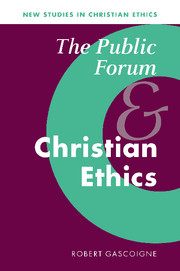Book contents
- Frontmatter
- Contents
- General editor's preface
- Acknowledgements
- Introduction
- 1 Revelation and reason in liberal societies
- 2 Revelation and a contemporary public ethics
- 3 The theology of revelation and Christian identity
- 4 The communication of Christian ethics in the public forum
- 5 Reconciling autonomy and community
- Select bibliography
- Index
3 - The theology of revelation and Christian identity
Published online by Cambridge University Press: 22 August 2009
- Frontmatter
- Contents
- General editor's preface
- Acknowledgements
- Introduction
- 1 Revelation and reason in liberal societies
- 2 Revelation and a contemporary public ethics
- 3 The theology of revelation and Christian identity
- 4 The communication of Christian ethics in the public forum
- 5 Reconciling autonomy and community
- Select bibliography
- Index
Summary
We concluded the previous chapter with the argument that the concept of revelation gives an ultimate context to the worth of persons as members of a ‘kingdom of ends’. The meaning of revelation is precisely an invitation to share in the life of the divine communio, in the life of the three-personed God. Through the union of the love of God and love of neighbour, this sharing in the divine life is also a communio with others, an infinite foundation to the ‘kingdom of ends’ of mutual respect and solidarity. The esteem of all is founded in the infinitude of divine regard, the worth of all nourished by the infinitude of divine love.
The concept of revelation as divine self-communication, as a sharing in the divine communio, is a necessary complement to the foundation and full development of notions of the ‘kingdom of ends’ which conceptualize discursive ethical processes marked by mutual respect. Yet, as we saw in chapter 1, the concept of revelation remains highly controversial in the ethical discourse of liberal and pluralist societies, redolent as it still is for many of sectarian conflict and of the conflict between the liberal state and religion.
In the present context, of course, the character of the debate has changed markedly. Until relatively recently, the debate was often conceived of as the tension between particular religious traditions, with their particular truth-claims, and a universalist Enlightenment tradition based in freedom and reason.
- Type
- Chapter
- Information
- The Public Forum and Christian Ethics , pp. 94 - 162Publisher: Cambridge University PressPrint publication year: 2000



